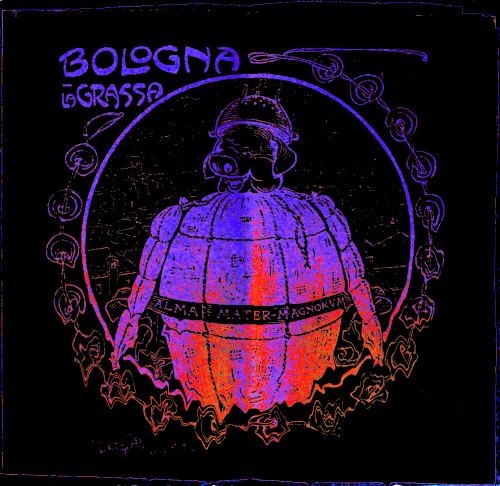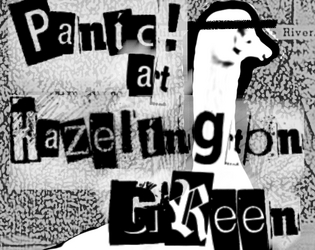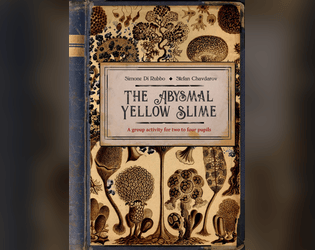Lovely, thanks!
giant_kumquat
Creator of
Recent community posts
Bella traduzione, grazie!
C'è una cosa che mi fa strano, se il file lo stampi -e l'ho stampato :)- il libro ha le pagine con i numeri dispari a sinistra e viceversa, praticamente il contrario di un libro normale.
Si risolve con una pagina bianca in più all'inizio, e la seconda edizione di Cairn è già uscita in inglese e magari non interessa più, ma non si sa mai, per la posterità :)
[English below]
Ho scritto questo commento senza aver giocato il mistero e con un problema dichiarato a giocare scenari scritti da altri, quindi prendi tutto con un grano (abbondante) di sale.
SPOILER!
Mi piace l’idea dietro lo scenario, con un orrore “delicato”, uno che prende la realtà a e la piega giusto un po. Me lo immagino funzionare molto bene, essere veramente disturbate nella sua normalità. Così reale da essere spaventoso.
Ho due problemi con questo mistero così com’è scritto, uno con il setup, l’altro con il flusso della storia.
Per il setup, credo che i PG siano troppo definiti, con una solida rete di relazioni e storie alle spalle su chi gioca non ha un input. Questo non sarebbe un problema se chi gioca avessero la libertà di scegliere elementi a piacimento per inspirazione, ma le prime quattro scene sono basate su questi PG dati dallo scenario, e lo scenario è punteggiato da note che ricordano di ricordare chi gioca del proprio background. Secondo me, questo richiede uno sforzo notevole da chi gioca, ma principalmente nella forma di studio di informazioni precise così come sono scritte e nel portare queste al tavolo al momento giusto, invece che di creare PG all’interno di limiti imposti dall’ambientazione e dal tono della storia. Queste informazioni sembrano essere necessarie per evocare un certo tipo di orrore richiesto dallo scenario, e quindi per una sessione di successo. Immagino dipenda dallo stile di gioco del gruppo, ma l’impressione che ho è che lo scenario richieda l’interpretazione di ruoli fissi da chi gioca, invece che un contributo alla narrazione della storia. In una maniera un po diretta, a chi gioca sembra di essere chiesto di recitare un ruolo, invece che di scrivere, dirigere, e recitare lo stesso ruolo assieme e in riposta agli stimoli di chi gioca con loro.
Allo stesso tempo, presentare PG nel mistero come esempi non fa giustizia al ruolo centrale che questi hanno nella storia così com’è scritta. Mi chiedo se cambiare la scrittura della sezione “the investigators” e i dei flashback possa aiutare a bilanciare il mistero per avere più input da chi gioca.
Per quanto riguarda il flusso del mistero, mi chiedo se avere il faro come luogo centrale per la storia possa rivoltarti contro. Dalla mappa e dal prologo sembra che il faro sia già prominente all’inizio. È molto probabile che gli investigatori lo visitino prima della fine del mistero, che nello scenario peggiore può dare l’impressione che il resto dell'investigazione sia un aspettare la visione alla seconda visita al faro. Gli indizi più forti che portano al faro sono a casa di Eleonaora – un luogo conosciuto per i PG e che ha una porta letteralmente aperta- il che potrebbe mandare il mistero in cortocircuito. Questo mi porta anche a chiedere quando la visione al faro dovrebbe essere rivelata. Capisco anche che tutto questo sia risolvibile con un po di lavoro al tavolo, ma questo richiederebbe un sforzo extra che toglierebbe la ragione d’essere di uno scenario.
Forse il problema può essere risolto lasciando la causa di morte incerta (tipo solo una caduta, con il corpo portato a riva dalle onde) e facendo sì che l’investigazione sia per trovare questo faro (potrebbe essere un un’altra città, o su un isola).
Un ultimo piccolo dettaglio, e questa è veramente solo una preferenza personale spocchiosa: non sono sicuro che mi piaccia il suggerimento per il risultato 1-3 nel paragrafo del faro, sembra andare contro il principio “fail forward” del gioco, introducendo un fallimento secco invece di un compromesso difficile per un tiro basso.
Spero ci sia dell’utile lì in mezzo. Non vedo l’ora di vedere come lo sviluppi!
-----------------
I write this without having played the mystery and with a self confessed problem in running pre-written scenarios, so take every criticism with a generous pinch of salt.
SPOILERS!
I like the idea behind the scenario, it's a "delicate" kind of horror, one that takes reality and tweaks it just so slightly. I can see working very well, being properly unsettling in its mundanity. So real it’s scary.
I have two problem with the mystery as it’s written now, one with the setup, and on with the flow.
For the setup is that the investigator characters are too defined, with a strong web or relationship and backstories on which the players had little or no input on. This would not much of an issue if the players had the freedom to pick and choose those elements for inspiration, but the first four scenes are based on charters elements dictated by the scenario, and the scenario is peppered with reminders for the keeper to remind the characters about their background. In my opinion, this demands a lot on the players, but in the form of studying precisely information as written and bringing it to the table at the right point as it is, rather than in creating their own characters within limits imposed by the setting and within a tone. This information seems to be required to successfully evoke the kind of horror that the scenario goes for, and in in turn, for a successful session. I guess this depends on the play style of the group, but the impression that I am getting here is is that the scenario asks an interpretation of fixed roles from the players, rather than a contribution to the narration of the story. In a very blunt way, the player here seems to be requested to act a role, rather then to write, direct, and act that same role for together and in repose to the other players at the table.
At the same time, presenting the pre-written characters as example for other character might not do justice to the central role that these characters have in the story as written here. I wonder if a tweaking of the wording investigator section and of the flashback scenes might rebalance the mystery to include more player input.
From the point of view of the flow of the story, I wonder if having the lighthouse as a central location of for the mystery might backfire. From the map and from the prologue, the lighthouse seems to be already very prominent at the start of the story. It’s likely that the investigators might visit the location before the end of the mystery, which in a worst case scenario might let the rest of the investigation feel like a time waster while waiting to summon the final vision while at the lighthouse the second time around. The strongest clues leading to the lighthouse seem to be at Eleonora’s -a location that every investigator seems to know and that has a literally open door in the text- which might short circuit the mystery. This also leads to the question of when the the last scene at the lighthouse should be triggered. I understand that all those could be tweaked by the game master while in play, but that would require extra work that somewhat defies the purpose of a scenario. I wonder if the problem can be solve by making the cause of death unclear (just a fall, for example, with the body washing ashore) and making the investigation also about finding/remembering the location of this lighthouse (it might be in another town, or on an island).
Last small thing, and this is definitely a petty personal preference: I am not sure I like the suggestions for 1-3 results under the lighthouse section, it seems to go against the “fail forward” approach of the game in general, introducing an hard failure instead of a hard compromise for a low roll.
I hope there’s something useful for you in here. Looking forward
to see how this develops!
Questo l’ho scritto senza aver giocato il mistero, solo dalla lettura del testo così com'è. Prendi tutto con le molle.
SPOILER (forse)
Il mistero sembra solido, la struttura della storia ha senso e I luoghi sono collegati bene tra loro. I luoghi principali sono ben descritti, con indizi che collegano ogni posto in maniera sensata. Ho solo due critiche, e molto minori. La prima è sulla stazione di polizia. Per come è scritta adesso, non sembra meritarsi un paragrafo a se. La stazione è lì solo per dare l'impressione che gli investigatori siano da soli, che chiunque sappia di Violetta non vuole che venga trovata sa perone amiche , ma non fornisce nessun indizio. Se questo è il caso, la stazione di polizia è un luogo che è possibile immaginare dall’orrore strisciante “La sensazione di essere continuamente inseguiti e osservati”. Credo che sia una questione di stile di gioco, ma come GM preferirei avere solo luoghi con indizi chiave nel testo, e troverei al contrario la descrizione di luoghi extra confusionale se dovessi fare riferimento al testo al volo.
L’altra critica, anche questa molto piccola e collegata al mio modo di giocare, è sulla descrizione del personaggio di Violetta, in particolare sulla quantità di dettagli nella descrizione. Alcuni dettagli son ovviamente centrali – musicista e compositrice-, ma altri sembrano essere elementi che tolgono l’opportunità al gruppo di gioco di sviluppare il personaggio durante la storia. Elementi come il fatto che violetta faccia volontariato, abbia studiato in scuole private, o che abbia una doppia cittadinanza sono ovviamente descrittivi, ma non hanno nessun legame con la storia come è scritta nel testo, e limitano forse la possibilità di creare legami con gli investigatori che siano definiti da gruppo di gioco. In particolare il fatto che Violetta si stia ancora riprendendo dalla morte del padre -un elemento ripreso dai temi principali del mistero- sembra dover essere un elemento centrale del personaggio e della storia, ma al momento non è così sviluppato da coprire quel ruolo e allo stesso tempo troppo ingombrante da essere ignorato o sostituito dai giocatori nella creazione di una loro narrativa. Ripeto, questa è una preferenza mia, mi piacciono descrizioni minimali che lanciano spazio per essere sviluppate, ma potrebbe essere un idea vedere cosa si può fare per integrare meglio il personaggio nella storia e lasciare allo stesso tempo più spazio per gli input del gruppo al tavolo.
Spero ci sia qualcosa lì in mezzo che ti aiuti. Non vedo l’ora di vedere nuovi sviluppi!
🇬🇧 I've lost track of the bizarre coincidences that started happening since I started writing. Do you have the feeling too that you start having a glimpse of that insane, viscous eldritch convolution that moves the celestial spheres themselves, while trying to see the horror in a familiar place ?
🇮🇹 Ho perso il conto di tutte le coincidenze bizzarre che sono successe da quando ho cominciato a scrivere. Hai anche tu al sensazione che si cominci ad avere un'idea della folle, viscosa sinistra macchinazione che muove le sfere celesti stesse quando provi a veder l'orrore in un posto familiare?
Ciao,
sto traducendo il mio mistero dall' inglese in italiano. Come traducete voi "The hook" e "Creeping horrors"? Non so se "Aggancio" ha la stessa accezione letteraria in italiano. E orrori inquietanti? Crescenti? Insinuanti? Striscianti? Suggestivi?
Bonus: qualcuno sa di link a pagine internet con una spiegazione in italiano della X-Card e di Lines and Veils?
Balancing between giving a solid mystery and not forcing my idea of the game on others has been as challenging as I expected. There is a fine line between describing key locations and charters, and those same locations and characters taking all the space in the game. I am not sure I succeeded, but I have definitely a better understanding of the craft going into that now.
Anyway, I think I am done with the bulk of the writing, but I still want to polish the wording in the "creeping horrors", "themes", and "on a 6" to help bring out a certain flavour of horror. I bet it's the most difficult part, but the most interesting, too. I am positive I should be able to wrap up something somewhat usable before the deadline, and hopefully an Italian translation to go along with it.

Hi there,
here's the deal: I have huge problems running scenarios as they are. I can wrap my head around games with an emergent mystery and I am a decent an improv GM, but when I set out to run one that has been written down by someone else, I rarely understand how I am suppose to do that by the book. Still, I feel like that I am missing out, with scenario written with good ideas for a lot of good games out there. I ran Cthulhu Dark recently, using a scenario for a change, and I feel I didn't do a great job.
Which means that I decided to jump into the first jam of my life with the idea of writing a scenario in order to understand better how a scenario should be run in the first place (go ahead, read that again, it still makes little sense to me as well).
Anyway, I have this idea for a scenario called Bologna la Grassa, dealing with insatiable hunger, physical and otherwise, in a town that I feel it's consuming itself, and what would people do to sate it, with delicious brooding cosmic horror powering it. I feel like a strong framing of the setup would do half of the job in having the players propelling themselves forward (and would take that bad aftertaste of railroading out of my mouth), so I am still a bit struggling with imaging who the investigators might be. I'm going for a disappeared person as the MacGufffin (a brilliant researcher at the uni) is what so a desperate colleague and maybe friends/family might still work, if a bit unoriginal.
The other idea is having the last part of the investigation in a place from which the investigator cannot escape easily. I like the idea of seeing the horror and not being able to do anything for it, but running away should still feel like an achievement. And maybe there should still be some reasons for investigators to stay, to face the horror for a bit longer. Which drops me back at square one with the setup, maybe?
I have a story-line, bits and pieces written for a few locations, but I think I need to crack these two first. Let's see where I land.





